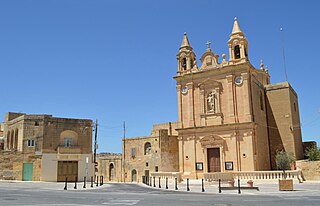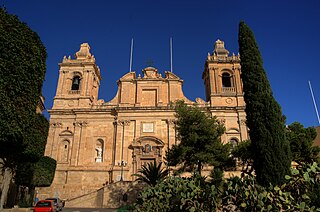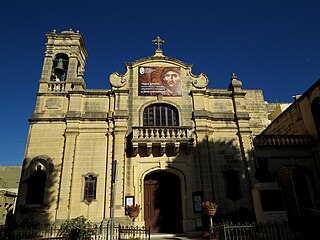
Victoria, also known among the native Maltese as Rabat or by its title Città Victoria, is the capital city of Gozo, the second largest island of Malta. The city has a total population of 6,901, and by population, is the largest locality in Gozo.

Munxar is a village which lies on the southern side of Gozo, Malta, close to the village of Sannat. It has its own local council. As of March 2014, the Munxar population was 1,454.

Malta is subdivided in districts of localities in order to administer the country in regions rather than locality. The districts have no administrative significance as the local councils provide the first-tier divisions of the country.

The Cittadella, also known as the Castello, is the citadel of Victoria on the island of Gozo, Malta. The area has been inhabited since the Bronze Age, and the site now occupied by the Cittadella is believed to have been the acropolis of the Punic-Roman city of Gaulos or Glauconis Civitas.

St Francis of Assisi Church, dedicated to St Francis of Assisi, in Valletta, was built in 1598 and was completed by 1607.

The Collegiate Parish Church of St Paul's Shipwreck, also known as simply the Church of St Paul's Shipwreck, is a Roman Catholic parish church in Valletta, Malta. It is one of Valletta's oldest churches.

St. George's Basilica or the Basilica and Collegiate Parish Church of Saint George, also simply known as San Ġorġ in Maltese, is a historic Baroque church situated in the middle of Victoria, the ancient "Ħaġar" – the capital of Gozo, the second largest island in the Maltese archipelago, and is surrounded by a maze of old narrow streets and alleys. Today's basilica was built between 1672 and 1678.

In the small Mediterranean island nation of Malta the predominant religion is Roman Catholicism.

The Collegiate church of Saint Lawrence is an old Church situated in Birgu in Malta.

The Church of St James is a Roman Catholic church building in Victoria, Gozo, Malta, situated in Independence Square, the centre of the town.

The Church of St Francis is a Roman Catholic church building in Victoria, Gozo, Malta, situated in St Francis Square. Adjacent to the church is the convent of the Conventual Franciscans.

The Church of the Nativity of Our Lady more commonly known in Maltese as Ta' Savina is a church situated in the heart of Victoria, in the island of Gozo, part of the Maltese archipelago.

The Church of Our Lady of Pompei is a Roman Catholic, Dominican church in Victoria, Gozo, Malta.

The Parish Church of St Philip of Agira is a Roman Catholic parish church in Żebbuġ, Malta, dedicated to Saint Philip of Agira.

The Cathedral of the Assumption of the Blessed Virgin Mary into Heaven is a Roman Catholic cathedral in the Cittadella of Victoria in Gozo, Malta. The cathedral is dedicated to the Assumption of Mary, and it has been the seat of the Roman Catholic Diocese of Gozo since the formation of the diocese in 1864.

St Paul's Church is a 20th century Roman Catholic parish church located in the village of Munxar on the island of Gozo in Malta.
Vincenzo Dimech was a Maltese sculptor. He is best known for his religious sculptures, which include the titular statues of Gudja and Floriana. He also sculpted monuments or architectural features in Valletta and Corfu.

The Basilica of the Nativity of Our Lady is a Roman Catholic parish church in Xagħra, Gozo, Malta, dedicated to the Nativity of Mary. The present building was constructed between 1815 and 1855, on the site of a smaller church which had been built in the 17th century. The dome was added in 1892. The church became a collegiate church in 1900, and a basilica in 1967.

The Parish Church of the Assumption of the Blessed Virgin Mary into Heaven is a Roman Catholic parish church in Żebbuġ, Gozo, Malta, dedicated to the Assumption of Mary. The present building was built between 1690 and 1726 on the site of an earlier church, and it was enlarged between 1938 and 1942. The church's interior was extensively decorated using locally-sourced travertine from cave deposits in the late 20th century.


















